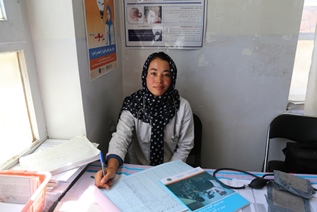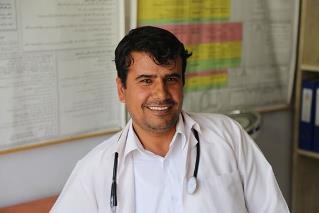 Habiba Jaffari wanted to become a midwife to help women in her community. WHO/S.RamoKabul 12 September 2017 – “I have been working as a midwife for 7 years but I didn’t know much about gender-based violence (GBV) before this training. Now I feel more prepared when GBV survivors come to the clinic to seek help,” says midwife Fatima, sitting at her desk at a treatment room in a small health centre in the Shiber district of Bamyan province.
Habiba Jaffari wanted to become a midwife to help women in her community. WHO/S.RamoKabul 12 September 2017 – “I have been working as a midwife for 7 years but I didn’t know much about gender-based violence (GBV) before this training. Now I feel more prepared when GBV survivors come to the clinic to seek help,” says midwife Fatima, sitting at her desk at a treatment room in a small health centre in the Shiber district of Bamyan province.
Gender-based violence, rooted in entrenched gender equality, is ubiquitous in Afghanistan. While data on GBV is scarce, according to a Global Rights study conducted in 2008, around 87% of Afghan women experience at least one form of GBV in their lifetime. WHO estimates that globally around 1 in 3 women have experienced either physical and/or sexual intimate partner violence or non-partner sexual violence.
The health sector plays an import ant role in responding to different forms of gender-based violence, including physical, sexual and emotional violence that all can have devastating consequences for physical, psychological and reproductive health.
Building skills, changing attitudes
WHO, with the support of USAID and the Italian Development Cooperation, is training over 6500 health care providers in all 34 provinces on how to properly manage cases of GBV, including physical, sexual and psychological violence. A GBV treatment protocol for health care providers, developed by the Ministry of Public Health and WHO with the support of UN Women in 2014, is being implemented across Afghanistan’s health facilities.
 Dr Muhammad Muhammadi at the Yakawlang District Hospital in Bamyan. WHO/S.Ramo“So far we have trained over 2800 nurses, doctors and midwives on the GBV protocol in 7 provinces and are moving on to the next phase of the programme to cover 14 more provinces over the next 2 years,” said Dr Sharifullah Haqmal, manager of the GBV programme at WHO. “We have seen positive changes in health care providers’ knowledge and attitudes in the target provinces. The training is making a difference.”
Dr Muhammad Muhammadi at the Yakawlang District Hospital in Bamyan. WHO/S.Ramo“So far we have trained over 2800 nurses, doctors and midwives on the GBV protocol in 7 provinces and are moving on to the next phase of the programme to cover 14 more provinces over the next 2 years,” said Dr Sharifullah Haqmal, manager of the GBV programme at WHO. “We have seen positive changes in health care providers’ knowledge and attitudes in the target provinces. The training is making a difference.”
The comprehensive 5-day training covers issues such as how to identify GBV, maintaining key principles of confidentiality and privacy and offering basic psychosocial support. The GBV Protocol training also covers physical and genital examinations and the clinical management of rape, burns and wounds. Training workshops are complemented by on-the-job training and mentoring at health facilities.
“After receiving the training, I can now identify GBV, offer treatment and referrals,” says midwife Fatima.
Dr Naiima has worked as a medical doctor at Herat Regional Hospital for over 9 years.
“I see many different types of violence against women in my work. There are suicide attempts, often through self-immolation (burning). I also see many women come in with wounds caused by knives or weapons, and also child marriages are common,” Dr Naiima says.
“Through the training, I have learned the role that health care providers should play in addressing GBV. We should respect confidentiality and safety at all times and not judge, but to listen and give information and treat survivors according to the protocol,” she says.
Health care providers are often the first point of contact for GBV survivors, making it essential that they can respond appropriately and safely.
“In the WHO training I learned about giving messages to survivors that highlight that they are not alone and that help is available. We are not here to judge but to offer support,” said Dr Mohammad Mohammadi, 36, a paediatric specialist in the Yakawlang District Hospital in Bamyan.
WHO and the Ministry of Public Health also train health facility managers on GBV case management and the GBV protocol to ensure that health facilities are better equipped and organized to offer quality care.
“The GBV protocol training programme has been very valuable for us,” said Dr Froghuddin Amiri, clinical manager at the Bamyan Regional Hospital. “We have evaluated our staff after they took the training and I can see a clear change. Their behaviour and interaction with the clients is a lot better now and they understand the importance of applying survivor-centred skills when dealing with GBV survivors.”
Stigma and shame prevent access to health care
Dr Rahmatullah, administration manager at the Yakawlang District Hospital in Bamyan, estimates that around 12 GBV survivors visit the hospital every month.
“Mainly we see cases of physical violence and domestic violence, often women are beaten by their husbands or other family members,” Dr Rahmatullah says.
 Fatima has worked as a midwife for 7 years at the Shumbol Basic Health Centre in Shiber, Bamyan. WHO/S.Ramo“Last month a 10-year-old girl was brought here. She was raped by a 35-year-old man and she was in complete shock and we couldn’t get her to speak to us. Finally our midwife, who is trained on the GBV protocol, sat with her for a while and she started to open up. The midwife conducted a physical and genital examination and provided her with the appropriate treatment,” Dr Rahmatullah says.
Fatima has worked as a midwife for 7 years at the Shumbol Basic Health Centre in Shiber, Bamyan. WHO/S.Ramo“Last month a 10-year-old girl was brought here. She was raped by a 35-year-old man and she was in complete shock and we couldn’t get her to speak to us. Finally our midwife, who is trained on the GBV protocol, sat with her for a while and she started to open up. The midwife conducted a physical and genital examination and provided her with the appropriate treatment,” Dr Rahmatullah says.
Most survivors of sexual violence do not willingly come to seek health care in clinics because of the stigma and shame they experience in the community.
“Most of the GBV cases we see are physical violence, mainly domestic violence, but a few times a month we also get rape survivors seeking help. The stigma associated with rape is so high that most women do not come to the health centre,” says Dr Froghuddin from the Bamyan provincial hospital.
Scaling up health response to GBV
An assessment carried out by WHO Afghanistan in 2015 showed major weaknesses in health service provision to GBV survivors: only 10% of facilities are well prepared to address GBV. Only a quarter of the 280 health facilities surveyed in 7 provinces had private examination rooms and only 2% of facilities had a protocol in place for GBV care. The assessment also showed major gaps in health care providers’ knowledge and attitudes regarding gender-based violence, its health consequences and the role of health care providers in helping survivors.
“The main challenge is that we don’t have enough space to give survivors of violence the privacy they need,” says Dr Naiima from Herat Regional Hospital.
Habiba Jaffari, a midwife working at the Yakawlang District Hospital, also notes that lack of adequate space makes maintaining confidentiality difficult. Most clinics in Afghanistan still lack crucial medicines to offer comprehensive treatment to GBV survivors, such as emergency contraceptives or HIV post-exposure prophylaxis (PEP) kits. Many health facilities are under-resourced and serve a large population, limiting the time health care providers can interact with clients.
Over the next 4 years, WHO continues to work with the Ministry of Public Health to train 4000 more health care providers on GBV care while integrating the GBV protocol into existing medical curricula in the country.
“Although we have challenges in this clinic, the GBV protocol training has helped me a lot. Before, I wasn’t aware of the different types of GBV and how to identify it. Every week I see around 5 women who suffer from violence. Now I am happy there is at least something I can do to help them recover,” Habiba says.


